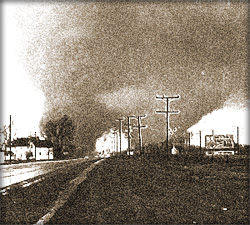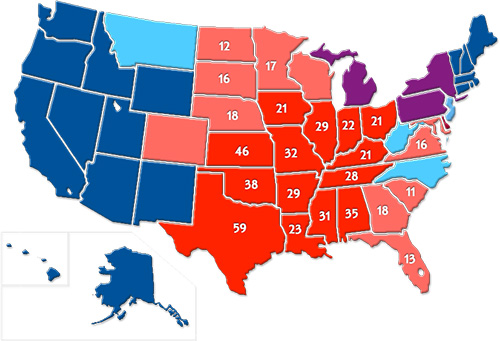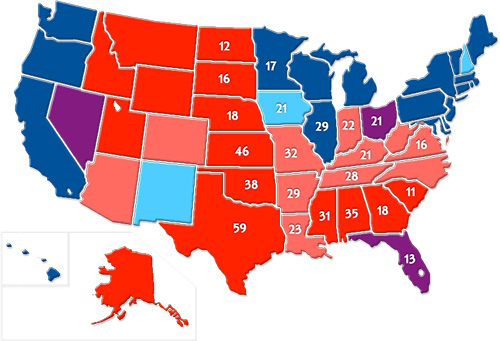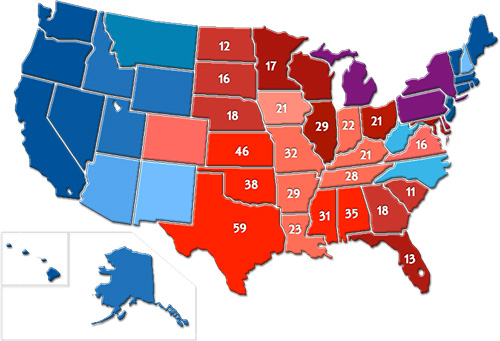- Paranoid?
- Envious?
- God-Fearing?
- Intolerant?
- Republican?

In recent days, I've been barraged by friends back on Mars inquiring about what psychological effects the recent spate of tornadoes in the South and Midwest United States must have on the humans there. Their interest got me to thinking, and I suddenly had an insight, which I'm sure has brightened the intellectual glow of many beings (both Martian and human) before me.
The insight encompasses the sociological effects of hurricanes as well, since the two devastating natural phenomena share some common traits... the most obvious being those furiously spinning wind and clouds.
My Martian theory also explains why tornadoes and hurricanes affect humans in ways that volcanoes, tsunamies, and earthquakes do not.
For brevity in the following paragraphs, I'm using the term "Recurring Events of Mass Destruction" (REMD) to refer to tornadoes and hurricanes, and the term "Unpredictable Events of Mass Destruction" (UEMD) to refer to volanoes, tsunamies, and earthquakes.
REMD. The distinguishing characteristics of REMD include:
- They happen every year.
- Though their frequency and severity vary from year to year, their geographical incidence is constant and encompasses huge areas of the country.
- Though you know they'll occur every year, you have no idea where exactly they'll strike.
- When they do strike, they invariably cause severe damage at the strike site.
UEMD. The distinguishing characters of these include:
- They happen whenever. Completely unpredictable.
- Most of the time, their effect on human life and property is minimal. Catastrophic events do occur, but their incidence is rare compared with REMD.
- The geographic range is much more limited and static than for REMD. Only a few States are affected by UEMD.
These widely differing attributes lead me to theorize the following psychological effects on humans who live in areas prone to REMD.
| Dread | The certainty of mass destruction lowers an unconscious web of dread on REMD people. Ongoing dread bends the psyche toward irrational fear of the unknown, as well as paranoia. |
| Envy and Schadenfreude | Although humans like to think otherwise, those who live in an area where one's town can be devastated while a town close by goes unscathed invariably feel envy when this occurs. Likewise, those in the spared town will feel the opposite—schadenfreude. Although this affects victims of UEMD too, the sociological effect is lessened by the lower incidence and narrower geographical confines of UEMD. Over time, envy and schadenfreude become ingrained in a community's collective psyche. |
| The widespread and continuous feelings of envy and schadenfreude can heighten suspicion of "outsiders" and lead to an intolerant, parochial view of the world. It can also make humans more stingy towards those beyond their immediate community. These people are more likely to adopt the philosophy, "Every Man For Himself," and they become incapable of seeing "beyond their own back yard" in terms of understanding people different from themselves. | |
| Religiousness | Throughout human history, people have been driven to religion to explain natural phenomena—both good and bad. If REMD are caused by God, then perhaps fear, dedication and prayer to God will help. Religion in REMD areas would therefore be expected to emphasize the fear factor of God, as well as a greater awareness of God's opposite—Satan, Evil. |
People living with UEMD are also affected by these feelings, but to a much lesser degree. Because of the infrequency and lack of predictable recurrence of UEMD, the emotions do not grip entire communities or regions. The primary psychological effect on humans of UEMD is a sort of Stoic Fatalism, which can be summed up in the philosophy "What Will Be Will Be." Stoicism tends to make humans more tolerant of others and more broad-minded about ideas.
Given these characteristics, it's now worth mapping their effects geographically, in order to see how the incidence of tornadoes correlates with the incidence of humans with those characteristics. Since the psychological makeup of Republican (conservative) humans aligns pretty well with the attitudes of those prone to REMD, I am using voting patterns as a proxy for sociological differences between areas affected by REMD and UEMD. The maps below adopt the paradigm of "blue" and "red" States to view the correlation.
Notes: The data in Map 1 are derived from statistics published by NOAA's Storm Prediction Center, and cover the 5 years from 2000-2004 . To improve focus, it doesn't show incidence numbers lower than 10. The number of States of a particular color on Map 1 is the same as the corresponding number Map 2 (Source: Wikipedia Commons).
This is the color legend for Map 2:
- The Republican candidate carried the State in the last four presidential elections (1996, 2000, 2004, 2008)
- The Republican candidate carried the State in three of the four most recent elections.
- The Republican candidate and the Democratic candidate each carried the State in two of the four most recent elections.
- The Democratic candidate carried the state in three of the four most recent elections.
- The Democratic candidate carried the state in all four most recent elections.



Although not a perfect predictor, tornado frequency correlates pretty closely with election results: The States that lie in the tornado "alleys" of the South and Midwest are almost all populated by Republican-leaning voters.
I should stress that this theory does not postulate that tornadoes are the sole predictor of a State's sociological makeup. For example, the characteristics this theory predicts for humans in REMD areas are also found in small-town and rural areas, which are heavily populated by parochial and intolerant humans. Red States that do not correlate with the tornado data but whose population predominantly lives in small towns and rural areas include Montana, Wyoming, Idaho, and Alaska.
Among the blue States, the biggest outlier is Illinois, which maps as solid red in tornado frequency but solid blue in voting pattern. Though this result seems surprising—as well as contradictory to my theory—it can be explained by noting that the incidence of tornadoes is primarily in the southern part of the State, which is also heavily Republican and has long considered itself part of the South.
It's worth noting that many of the red and pink States on the third map are also those that suffer the most REMD by hurricanes—South Carolina, Georgia, Florida, Mississippi, Alabama, Louisiana, and Texas. Adding hurricanes to the tornado data above would undoubtedly also turn North Carolina red.
And this, my fellow Martians, is my explanation of how tornadoes affect the sociology of the human populations they afflict.
Schadenfreude.
Pleasure derived by someone from another person's misfortune.
Envy.
A feeling of discontented or resentful longing aroused by someone else's possessions, qualities, or luck.
Dread.
Anticipate with great apprehension or fear.
Intolerance.
Not tolerant of others' views, beliefs, or behavior that differ from one's own.
Parochialism.
Having a limited or narrow outlook or scope.
Religiousness.
Believing in and worshiping a superhuman controlling power or powers, esp. a personal God or gods.
Stoicism.
The endurance of pain or hardship without a display of feelings and without complaint.
Fatalism.
A submissive attitude to events, resulting from the belief that all events are predetermined and therefore inevitable.
Broad-minded.
Tolerant or liberal in one's views and reactions; not easily offended.
Republican.
A person who is averse to change and holds to traditional values and attitudes, typically in relation to politics.
God.
The creator and ruler of the universe and source of all moral authority; a superhuman being or spirit worshiped as having power over nature or human fortunes.
Paranoia.
Suspicion and mistrust of people or their actions without evidence or justification.












